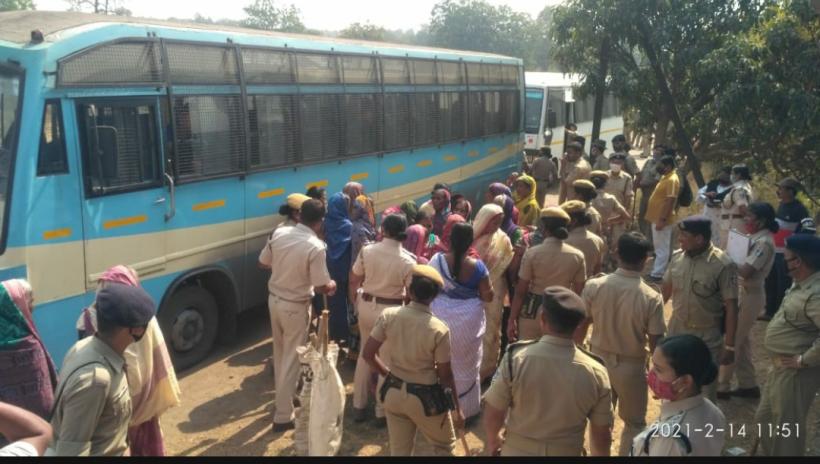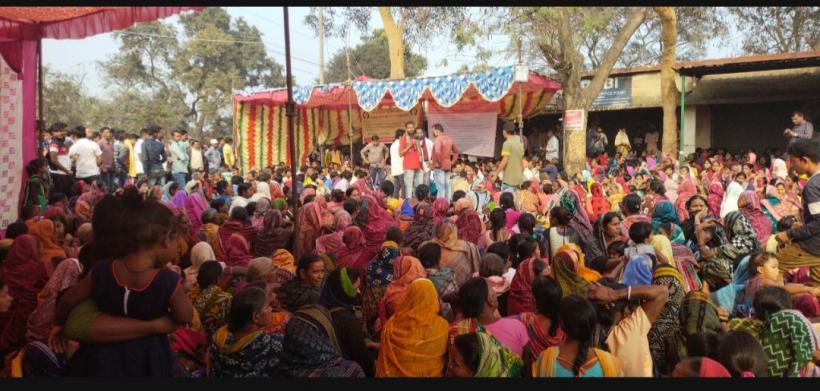The adivasi villagers from Sundargarh district have been protesting against the clearance given to Kulda mines for expansion stating that coal mining activity is creating a path of destruction for their villages.
Sumedha Pal 16 Feb 2021
Sixteen adivasi activists and leaders were reportedly arrested from the protest site where they were protesting against the expansion of the Kulda mines in Odisha’s Sundargarh district on February 14.
Neglecting the concerns of the indigenous population over excessive pollution of air, water bodies and fields, the central government has paved the way for expansion of coal mining activity in Kulda mines, set in the Tapriya region.
The area is home to particularly vulnerable tribal groups (PVTGs), who have been resisting the expansion of the mines by staging protests from January 19, since the news of the clearance poured in. As protests gained momentum across 18 villages in the region, the state government imposed section 144, in a bid to crackdown on protests.
Talking about the arrests of the activists, Sadananda Sahu, an activist who is part of the protest, told NewsClick, “The arrests have been made yesterday, in a bid to stop us all. There have been reports that the activists were also beaten up by the forces. They were told that if they do not stop they will be killed. We have come to know that section 307, which is the charge for attempt to murder is slapped on the activists. We are currently in the process of finding more about the police charges and the legal recourse.”

The villages are home to the Khadiya tribal community, and other tribes such as Oram and Gond communities. The residents have consistently stated that the coal transported to Chhattisgarh from this mine and the fly ash generated from it has polluted their agricultural fields and their water bodies, even impacting drinking water at their homes and anganwadi centres.
In the latest clearance for expansion, the mine’s capacity is set to increase from the current 14 million tonnes per annum (MTPA) to 19.60 MTPA.
The mine’s operations are run by the Mahanadi Coalfields Limited (MCL) which owns the mine. The expansion was reportedly agreed on the condition that the company plants 100,000 native trees with broad leaves along the villages and 50,000 trees along the transportation route in two years to prevent air pollution, according to the latest minutes of the EAC published on the Parivesh website.
The Hindustan Times reported, “The EAC has also directed MCL to operationalise three air quality monitoring stations by March, update related data in real time on the company website and display it in the mining lease area.”
Speaking to NewsClick, activist Santosh Dora from Odisha, explained, “All of our fields stand destroyed, the Ministry of Environment repeatedly states that coal is not being transported from across the villages, which is not true. The same has been reported in MCL’s finance report also, but when villagers analysed the situation and took it up, we were told that no coal transportation will be allowed until April 5, 2021. While the transportation has been stalled Section 144 was issued by the SDM in the area and our leaders were arrested.”
He added, “People have brought rice, water and have raised funds, held meetings to decide to hold this strike. The movement has been ongoing for the last 20 days against this illegal transportation of coal.”
The mine has been functional since 2007 and was given an extension of functioning for the next 30 years in January 2020, despite the opposition in the villages and non compliance of environmental protocols.

Leave a Reply